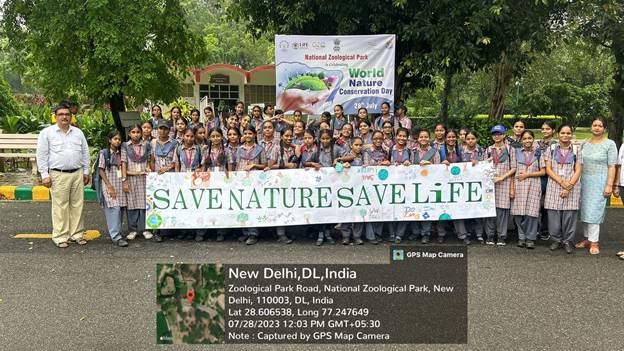Description

Disclaimer: Copyright infringement not intended.
Context
- National Zoological Park, New Delhi (Delhi Zoo) celebrated World Nature Conservation Day on 28th July.
- The theme for World Nature Conservation Day 2022 was “Forests and Livelihoods: Sustaining People and Planet”.
Details
Forests as Ecosystems
- Forests are not just a collection of trees; they are complex ecosystems that support a vast array of plant and animal species.
- These ecosystems play a vital role in maintaining ecological balance by regulating climate, conserving water, and preventing soil erosion.
- They act as natural habitats for numerous species, contributing to biodiversity conservation.
Forests and Livelihoods
- Forests directly and indirectly impact human livelihoods in various ways.
- They provide valuable resources such as timber, fuelwood, fruits, nuts, and medicinal plants, which support the livelihoods of millions of people, especially in rural communities.
- Additionally, forests offer non-tangible benefits by providing recreational opportunities and spiritual significance to indigenous communities.
Biodiversity Conservation
- Forests are biodiversity hotspots, housing an incredible diversity of plant and animal species.
- Protecting and conserving these habitats is essential for preserving biodiversity and preventing the loss of endangered species.
- Biodiversity conservation is crucial for maintaining ecological balance, as each species plays a unique role in the ecosystem.

Sustainable Forest Management
- Sustainable forest management is the key to ensuring the long-term health and viability of forests.
- It involves using forest resources in a manner that meets the needs of the present generation without compromising the ability of future generations to meet their needs.
- Responsible practices include selective logging, afforestation, and reforestation to maintain ecological integrity.
Forests and Climate Change
- Forests play a vital role in mitigating climate change by acting as carbon sinks.
- They absorb carbon dioxide from the atmosphere during photosynthesis and store it as biomass.
- However, deforestation and forest degradation release stored carbon back into the atmosphere, contributing to global warming.
- Conserving and expanding forest cover is crucial for climate change mitigation.
Empowering Local Communities
- Many communities around the world depend on forests for their livelihoods.
- Empowering these communities with sustainable forest management knowledge and skills helps balance their needs with conservation goals.
- Community-based forestry initiatives have shown promising results in maintaining forest health while supporting local livelihoods.
Combating Illegal Logging and Wildlife Trade
- Illegal logging and wildlife trade pose significant threats to forests and biodiversity.
- Rampant deforestation for commercial gains and illegal wildlife trade for rare species endanger the delicate balance of ecosystems.
- Strengthening law enforcement and implementing strict regulations are essential to combat these destructive activities.
Afforestation and Reforestation
- Afforestation, the process of planting trees in areas that were not previously forested, and reforestation, restoring tree cover to previously deforested areas, are vital strategies to increase forest cover.
- These initiatives contribute to carbon sequestration, enhance biodiversity, and support ecosystem services.
Public Awareness and Education
- Raising public awareness about the importance of forests and nature conservation is essential.
- Educating individuals and communities about the benefits of forests, the threats they face, and their role in preserving nature can lead to greater support for conservation efforts.
Policy Advocacy and International Cooperation
- Effective policy advocacy at both national and international levels is crucial for sustainable forest management and conservation.
- Governments, organizations, and individuals need to collaborate and make collective efforts to combat deforestation, promote afforestation, and adopt sustainable practices.
Global Initiatives on World Nature Conservation
- United Nations Sustainable Development Goals (SDGs): The United Nations has set ambitious goals under the SDGs, including Goal 15, which focuses on protecting, restoring, and promoting sustainable use of terrestrial ecosystems, including forests. It aims to halt deforestation, restore degraded forests, and combat desertification and biodiversity loss.
- Paris Agreement: The Paris Agreement, under the United Nations Framework Convention on Climate Change (UNFCCC), seeks to combat climate change by limiting global warming to well below 2 degrees Celsius. It recognizes the role of forests in carbon sequestration and encourages countries to enhance afforestation and reforestation efforts.
- The Bonn Challenge: Launched in 2011, the Bonn Challenge is a global effort to restore 150 million hectares of deforested and degraded land by 2020 and 350 million hectares by 2030. It aims to bring countries, organizations, and communities together to restore landscapes and combat climate change.
- Convention on Biological Diversity (CBD): The CBD is an international treaty aiming to conserve biodiversity, promote sustainable use of its components, and ensure fair and equitable sharing of benefits arising from genetic resources. It encourages the conservation of forests as critical habitats for biodiversity.
- The Global Partnership for Forest and Landscape Restoration (GPFLR): GPFLR is a global initiative that promotes forest and landscape restoration to address issues of deforestation, degradation, and loss of ecosystem services. It brings together governments, NGOs, and private sector partners to scale up restoration efforts worldwide.
Indian Initiatives on World Nature Conservation
- National Afforestation Programme (NAP): The NAP is a centrally sponsored scheme launched by the Government of India to promote afforestation and reforestation activities. It focuses on increasing forest cover and restoring degraded lands.
- Green India Mission (GIM): The GIM is one of the eight missions under the National Action Plan on Climate Change (NAPCC). It aims to increase forest cover on 5 million hectares of land and improve ecosystem services through afforestation and reforestation.
- Compensatory Afforestation Fund Act (CAMPA): The CAMPA was established to manage funds collected from various agencies for compensatory afforestation. It ensures that funds are used efficiently for afforestation and biodiversity conservation.
- National Biodiversity Targets: India has set national biodiversity targets to achieve various conservation goals, including increasing the forest and tree cover, restoring degraded ecosystems, and conserving biodiversity-rich areas.

Conclusion
World Nature Conservation Day serves as a reminder to the global community to take collective action in conserving nature and protecting forests. Both global and Indian initiatives play a crucial role in addressing the challenges of deforestation, biodiversity loss, and climate change. By implementing these initiatives, nations can work towards a sustainable future that ensures the well-being of both people and the planet.
|
PRACTICE QUESTION
Q. World Nature Conservation Day serves as a reminder to the global community to take collective action in conserving nature and protecting forests. Discuss the significance of forests in sustaining people and the planet, and analyze the role of global and Indian initiatives in addressing the challenges of deforestation, biodiversity loss, and climate change. (250 Words)
|
https://pib.gov.in/PressReleasePage.aspx?PRID=1943792
















